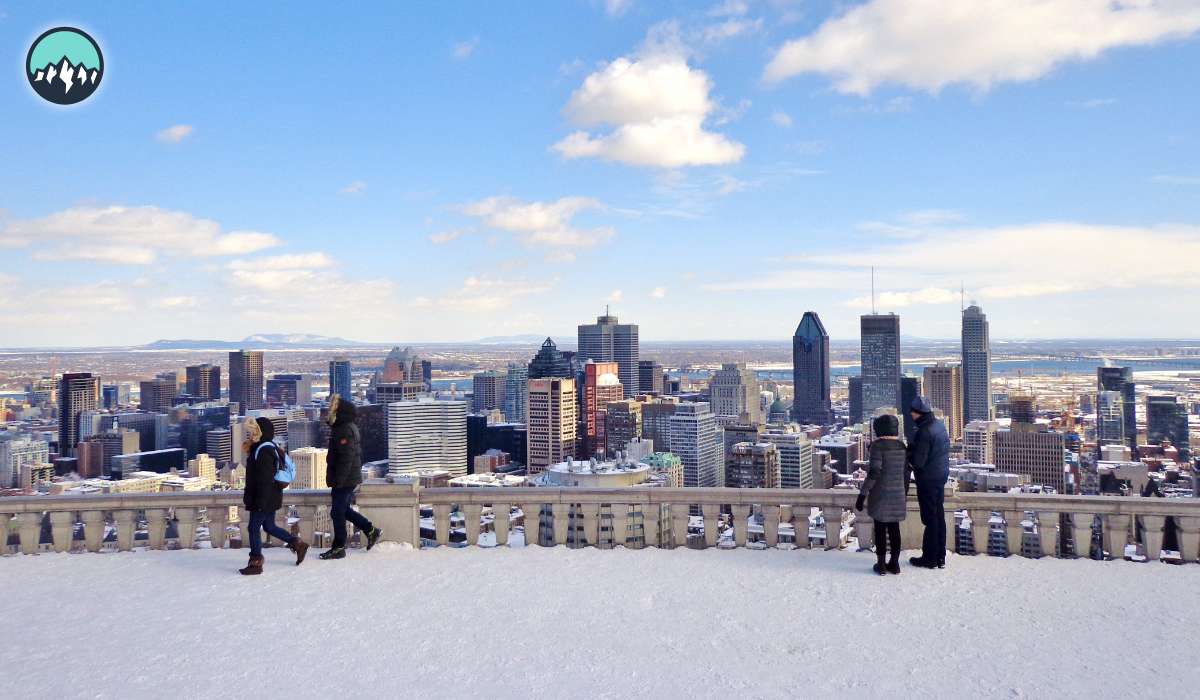Why Montréal is the Perfect Canadian City for Bilingual Working Holidaymakers
14 Apr 2025

For those with a Working Holiday Visa and fluency in French and English, searching for the ideal Canadian city often leads to one vibrant metropolis: Montréal. This unique urban center in Quebec smoothly blends European charm with North American enterprise, creating an unparalleled experience for young adventurers. Beyond the professional advantages, Montréal boasts a thriving cultural scene, affordable living costs compared to other major Canadian cities, and a welcoming atmosphere for newcomers in Montreal.
Discover why Montréal stands out as the ultimate Canadian city for bilingual working holidaymakers seeking an enriching and memorable chapter.
What Makes Montréal Ideal For Bilingual Working Holidaymakers?

Montréal is a vibrant, multicultural Canadian city where French and English coexist seamlessly, making it an ideal destination for bilingual working holidaymakers. Here are some factors that make Montréal ideal for a working holiday.
A Truly Bilingual City
Montréal is the second-largest Canadian city and the largest French-speaking city in North America. Yet, unlike other parts of Québec, Montréal is officially bilingual, and English is widely spoken. Most locals are fluent in both languages, and services are often offered in English and French. This dual-language environment is perfect for bilingual working holidaymakers in Montreal who want to practice and use both languages daily.
This linguistic diversity extends to the job market, signage, entertainment, and education. From ordering coffee to attending events or working in retail, employees often switch seamlessly between English and French. As a result, bilingual visitors find it easier to integrate while also gaining valuable language practice that could enhance their careers long-term.
Strong Job Market for Bilingual Workers
Montréal’s economy is thriving, with particular strengths in sectors ideal for working holidaymakers, such as tourism, hospitality, customer service, education, and the arts. Bilingualism is not only an asset in these fields; it’s often a requirement. Businesses appreciate employees who can serve French and English-speaking customers, making bilingual candidates especially competitive. Common job types for working holiday participants include:
- Barista and café jobs,
- Retail associates in downtown stores and shopping centers,
- Servers and bartenders in the city's many restaurants and bars,
- Hostel and hotel front desk roles,
- Event staff for festivals and conferences, and
- Teaching assistants or language tutors.
Job listings on platforms such as Job Bank Canada, Indeed, and Emploi-Québec regularly highlight Montréal-based roles requiring bilingual applicants. International employers like Air Canada, Ubisoft, and Cirque du Soleil also have operations in Montréal, offering short-term roles and internships in diverse sectors.
Affordable Urban Living Compared to Other Canadian Cities
Canada is known for high living costs, particularly in Toronto and Vancouver. Montréal, while urban and lively, remains relatively affordable. According to Numbeo, rent prices in the city are 30–50% lower than in Vancouver and Toronto. Here is a table of key cost comparisons with figures from Numbeo.
| Expenses | Average Monthly Cost in Montreal (CAD) | Average Monthly Cost in Toronto (CAD) | Average Monthly Cost in Vancouver (CAD) |
|---|---|---|---|
| 1-Bedroom Rent (City Center) | 1,684.53 | 2,507.89 | 2,774.47 |
| Public Transport Pass | 100.00 | 156.00 | 120.00 |
| Meal at a Mid-Range Restaurant | 100.00 | 120.00 | 100.00 |
That is particularly beneficial for working holidaymakers in Montréal who live on a modest budget.
Montréal offers a variety of shared housing, short-term rentals, and furnished apartments, many of which are posted on local Facebook groups and sites like Kijiji and Craigslist. Popular neighborhoods for newcomers in Montreal include Plateau-Mont-Royal, Rosemont, Verdun, and Mile End; each has its vibe but is known for welcoming young professionals and students.
Rich Culture and European Atmosphere
The city’s unique character comes from its deep blend of North American and European influences. With cobblestone streets in Old Montréal, historic French architecture, and vibrant street art in the Plateau, the city feels like a slice of Europe in Canada. This charm attracts travelers, creatives, and digital nomads worldwide. Montréal is known for:
- Festivals: The city's calendar is packed with events from the Montréal International Jazz Festival to Just for Laughs and Nuit Blanche. Many of these festivals also offer seasonal or contract work to bilingual staff.
- Cuisine: A paradise for foodies, Montréal offers everything from poutine and bagels to fine French cuisine and international street food.
- Art and Music: The city’s vibrant art scene includes street murals, indie music venues, and world-class galleries.
- Bilingual Social Life: Whether attending a language exchange, joining a Meetup group, or taking part in cultural tours, bilingual holidaymakers can socialize easily in either language.
Language Learning Opportunities
Even for those who aren't fully fluent in French and English, Montréal offers incredible opportunities to improve your language skills on the job or through affordable classes. Organizations such as Le Français en Partage, YMCA International Language School, and Université de Montréal’s language center offer flexible French courses ideal for working holidaymakers.
Québec’s government often subsidizes French classes for newcomers in Montréal, making them accessible and affordable. The immersive bilingual environment also encourages fast learning. Daily interactions - from shopping and public announcements to watching TV - offer natural ways to boost language fluency. For those with a working knowledge of both languages, Montréal provides the perfect environment to fine-tune your fluency in French through lived experiences.
Friendly Visa and Immigration Policies
Montréal is located in Québec, but most working holiday participants enter Canada through the federal International Experience Canada (IEC) program. Under IEC, citizens from more than 30 countries, including Australia, the UK, Ireland, Germany, Japan, and others, can apply for a Working Holiday Visa. The Working Holiday Visa allows travelers aged 18–35 (depending on nationality) to work in Canada for up to 12 or 24 months.
Once approved, Working Holiday Visa holders can choose their destination city, and Montréal is often a top pick for its affordability and bilingualism. The city also has many support networks for new arrivals. Local organizations such as YES Montréal, Welcome Collective, and Maison de l’amitié provide resources and workshops for job seekers, language learners, and new immigrants.
Diverse and Inclusive Community
Montréal is one of the most multicultural cities in Canada, with more than 120 cultural communities and nearly 35% of the population born outside the country, according to Statistics Canada. The city embraces diversity in language, ethnicity, religion, and sexual orientation, making it a welcoming place for people from all walks of life.
This inclusivity extends to the workplace, where multicultural teams are common and intercultural communication is valued. As a result, bilingual working holidaymakers in Montreal from abroad often feel more at home in Montréal than in other less diverse regions. Events like Pride Montréal, Carifiesta, and Festival Accès Asie celebrate this diversity yearly.
What Are Some Must-see Attractions in Montréal?

Montréal has must-see attractions highlighting its rich history, vibrant arts scene, and unique cultural fusion. Here are some examples:
- Old Montréal (Vieux-Montréal): At the top of the list is Old Montréal (Vieux-Montréal), where visitors can stroll along cobblestone streets, admire the 17th-century architecture and visit the stunning Notre-Dame Basilica, known for its intricate woodwork and dazzling stained-glass windows.
- Mont Royal: Another iconic site is Mount Royal (Mont Royal), the city’s namesake hill designed by Frederick Law Olmsted. It offers breathtaking panoramic views of downtown Montréal, scenic trails, and outdoor activities year-round.
- Jean-Talon Market: For a taste of Montréal’s multiculturalism, Jean-Talon Market in Little Italy is a must. One of North America's most prominent public markets, it offers an abundance of fresh produce, local delicacies, and international flavors.
- Montreal Museum of Fine Arts: Art and history enthusiasts should explore the Montreal Museum of Fine Arts and Pointe-à-Callière Museum, the city’s archaeology and history complex.
- Le Plateau-Mont-Royal and Mile End: Neighborhoods like Le Plateau-Mont-Royal and Mile End are excellent for street art, vintage boutiques, and iconic foods like smoked meat and bagels.
- Parc Jean-Drapeau: Meanwhile, Parc Jean-Drapeau, located on islands in the St. Lawrence River, is home to La Ronde amusement park, cultural festivals, and waterfront relaxation.
These attractions make Montréal a city full of discovery for every type of traveler.
How Can I Make the Most of My Working Holiday Experience in Montréal?

To make the most of your working holiday experience in Montréal, you must embrace its professional and cultural opportunities. Here are some of the tips you can follow.
- Start by securing flexible, seasonal, or part-time jobs in hospitality, retail, or customer service, industries that often welcome bilingual international workers.
- Use platforms like Job Bank, Indeed, and local Facebook groups to find openings and tailor your résumé to Canadian standards.
- Outside work, immerse yourself in the city’s bilingual culture by attending French language meetups or enrolling in subsidized language classes offered through organizations like the YMCA or the MILLE Centre.
- Explore different neighborhoods to experience Montréal’s diversity truly; from the artsy Plateau-Mont-Royal to historic Old Montréal.
- Take advantage of the city’s vibrant festivals, like the Montréal International Jazz Festival and Just for Laughs, which often offer free events.
- Using public transportation with a monthly OPUS card helps you explore affordably.
- Lastly, connect with fellow working holidaymakers in Montreal and locals to build lasting friendships and gain insider tips on living well in the city.
FAQs
What Are Some Popular Neighborhoods for Young People and Working Holidaymakers in Montréal?
Popular neighborhoods for young people and working holidaymakers in Montréal include Plateau-Mont-Royal, known for its artistic vibe and vibrant nightlife, and Mile End, a multicultural hotspot full of cafés, vintage shops, and coworking spaces. Downtown Montréal and Griffintown offer a more modern, urban lifestyle with easy access to jobs and public transport.
How Can I Find Accommodation in Montréal as a Working Holidaymaker?
To find accommodation in Montréal, use platforms like Kijiji, Craigslist, Facebook Marketplace, and local rental sites like Rentals.ca or AppartMap. Short-term rentals and shared housing are popular for working holidaymakers in Montreal, especially in student-heavy areas like the Plateau or Côte-des-Neiges.
Is Speaking French and English Necessary to Live and Work in Montréal?
While many jobs in Montréal require at least basic French, especially in customer-facing roles, English is widely spoken and can be sufficient in some industries like tourism or tech. Knowing both languages greatly increases your job and social opportunities.




